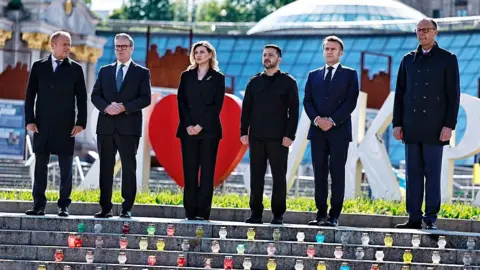European leaders pressure Russia over 30-day Ukraine ceasefire
 Getty Images
Getty ImagesEuropean leaders have urged Russia to agree to an unconditional 30-day ceasefire with Ukraine starting on Monday.
The call was issued at a meeting of the "coalition of the willing" in Kyiv. The leaders of France, Germany, the UK and Poland were hosted by Ukraine's Volodymyr Zelensky, while others joined remotely.
They made the announcement after discussing the plan by phone with US President Donald Trump - who initially mooted an unconditional ceasefire. The leaders threatened Russia with "massive" sanctions if it does not comply.
The Kremlin said it was considering the proposal but would not respond to pressure.
After Saturday's meeting in Kyiv, UK Prime Minister Keir Starmer said: "All of us here together with the US are calling [Russian President Vladimir] Putin out. If he is serious about peace, then he has a chance to show it."
He was speaking alongside Zelensky, French President Emmanuel Macron, Polish PM Donald Tusk and the new German Chancellor Friedrich Merz.
Zelensky said: "Thank you all for standing with us. Today we will focus on how to build and guarantee real and lasting security."
Russia has so far insisted that before considering a ceasefire, the West must first halt its military aid to Ukraine.
However, Zelenksy said that the ceasefire should be unconditional.
"Attempts to put forward any conditions would be evidence of an intention to prolong the war and undermine diplomacy," he added.
Macron said the planned truce would be monitored mainly by the US, with help from European countries. He said in the event of violation, "massive sanctions would be prepared and co-ordinated between Europeans and Americans".
Merz said the war - which began with the full-scale invasion of Ukraine in February 2022 - was "solely a war of aggression by Russia, in violation of international law".
The Kyiv meeting was a symbolic response to the more than 20 leaders who joined Putin in Moscow a day earlier.
Other leaders who joined the Kyiv meeting remotely included Italy's Prime Minister Giorgia Meloni, Canadian PM Mark Carney, President of the European Commission Ursula von der Leyen, and Mark Rutte, the secretary-general of Nato.
A 30-hour ceasefire, called on Friday by Putin to mark Russia's Victory Day, is due to end later on Saturday. It has seen a decrease in fighting but both sides have accused the other of breaches.
The coalition of the willing was formed to reinforce any eventual peace agreement with security guarantees, including the possibility of placing troops in Ukraine.
Trump earlier reiterated the call for an unconditional 30-day ceasefire after a phone call with Zelensky.
"If the ceasefire is not respected, the US and its partners will impose further sanctions," he wrote on social media.
In response, Kremlin spokesman Dmitry Peskov accused the Europeans of making contradictory statements that "are generally confrontational in nature rather than aimed at trying to revive our relations".
Russian state media later quoted Peskov as saying: "We have to think this through. But trying to pressure us is quite useless."
Reports of Russian attacks across Ukraine continue, despite Russia's claims of a temporary ceasefire.
In the northern Sumy region, an 85-year-old woman was killed, three others were injured, 19 residential homes and 10 other buildings were destroyed or damaged, Ukrainian police said.
In Kostyantynivka, eastern Donetsk region, one person was injured and two apartment blocks caught fire after Russian attacks, Ukrainian state emergency service DSNS said.
And in the southern city of Kherson, a 58-year-old local resident sought medical help after being attacked by a Russian drone carrying explosives, the regional administration said.
